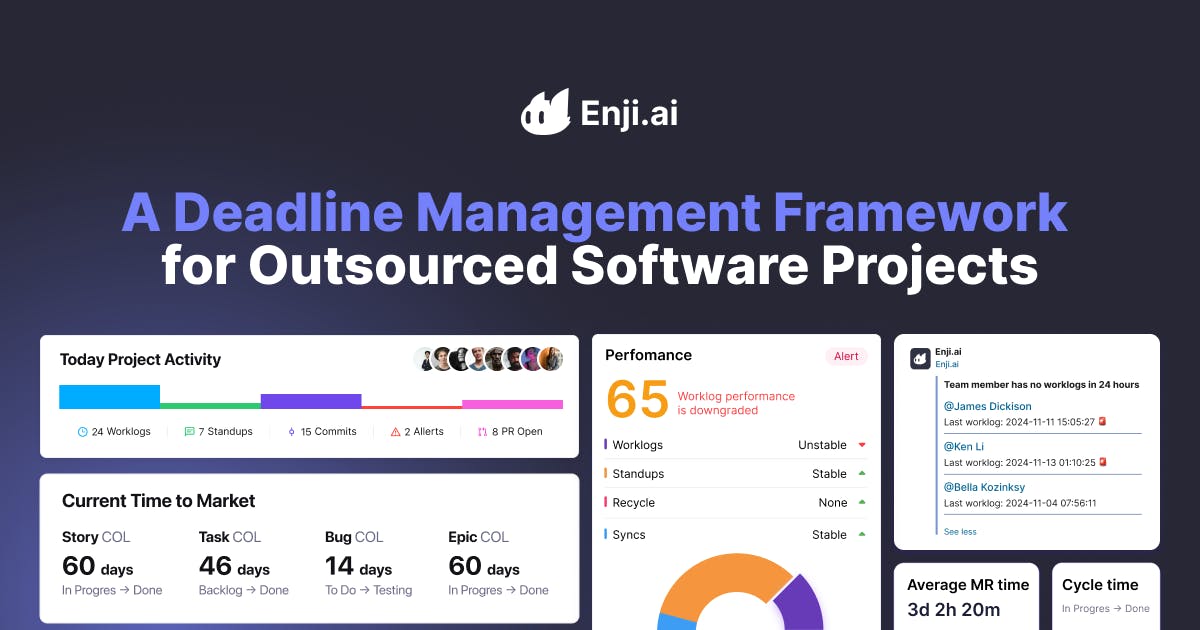A Client's Deadline Management Framework for Outsourced Software Projects

Analyze with AI
Get AI-powered insights from this Enji article:
The competitive B2B technology landscape of today demands effective deadline management with software development outsourcing partners. Unfortunately, barriers such as poor communication and the misinterpretation of the value of deadlines prevent businesses from achieving their targets on time. According to the 2020 Standish Chaos Report, 50% of projects end with an exceeded budget and deadline. To stay out of this statistic and balance timely delivery with quality, businesses need to establish clear communication among all teams involved in a project.
This article examines the importance of communication as well as other essential components of working with outsourcing partners in the context of deadline management. Businesses that adopt these strategies improve how different teams understand the importance of deadlines and maximize value delivery with vendor development teams.
What is a deadline?
While the answer may seem obvious, it is very important to break down the concept of a deadline. In its basic form, a deadline is a specific day or time by which something should be done. In an outsourcing project, or any project for that matter, however, this definition does not answer the crucial question of what happens if a deadline is missed. That detail determines the specific context of a deadline. A clearer definition divides deadlines into two types:
Due date: a soft deadline
This is a deadline that refers to a desired date after which work should continue. For example, an outsourcing team is told to complete a feature for an app by May 29th because the business team wants to review it and discuss any changes that could be made. What happens if the development team misses the deadline and completes the work later? The business team will not be happy, but work can continue, and the feature will be available later. The process of reviewing and changing will still occur.
Expiration date: a hard deadline
This is a deadline that sets a firm date after which there is no point in continuing work. One situation where this type of deadline is applicable is when the business team wants to present a feature or a demo at an event. If it looks like the development team will miss the deadline, they may work faster and harder to complete their tasks and meet the target. Otherwise, the business team will not have anything to show. If they do not meet this deadline, the moment has passed, and all the work done before it was a waste of time.
In both situations, it would be better for the development team to complete the work on time; however, missing the "expiration date" deadline results in more serious consequences than the first. The missing link between these situations and an important element of managing deadlines in a software project timeline is transparent communication. When all the teams involved understand the reason behind a deadline, as a progress check or for an event, there is less chance of missing it. Of course, there are various factors involved in development that affect the speed and progress of work. Communication ensures that the teams define their expectations and work together to create a feasible plan that accounts for the details.
6 steps to take for better deadline management
Clients of outsourced development teams need to take into account the types of deadlines they need and other aspects of project planning to ensure the vendor follows the timeframe. The 6 steps below outline specific actions clients can take in deadline management to create a plan that supports work being delivered on time.
1. Build cross-team communication
As mentioned in the examples of the previous section, the teams in a project can have different ideas and priorities for a product or a specific feature. The sales team wants to present and demonstrate a minimum viable product (MVP) as soon as possible, while the outsourced development team has its own priorities based on technical aspects. For them, the deadline set by the business team may not be realistic. Both groups share the same goal, but they sometimes speak different languages. Proper communication helps everyone understand the situation and the value of a particular "due date" or "expiration date" deadline. For example, if a presentation will allow the team to secure more funding for their product, then it is in the best interest of everyone involved to meet the deadline.
2. Avoid "bad" multitasking
Teams multitask while working on a project to ensure that work continues without unnecessary interruptions. The balance of various tasks can become a distraction, though, and keep a development team from completing their work before a hard deadline. When a team must meet an important target, the business team will need to communicate with the developers a clear list of priorities to focus them on completing the necessary tasks on time. Work that is not relevant to the deadline will be placed on hold to allow the development team to concentrate.
3. Verify development team expertise
Part of a project's context is knowing the knowledge and abilities required to create a particular product or feature, and clients need to check that an outsourcing team has the necessary technical expertise. Imagine a financial technology startup that hires a vendor to migrate its monolithic application to a microservices architecture deployed on Kubernetes. The team claims to have cloud expertise but has minimal practical experience with Kubernetes implementation. This lack of knowledge could result in serious delays and other issues, such as unstable deployments, performance issues, and security vulnerabilities. Deadlines will be the last worry on the client's mind. To avoid this, they can verify essential knowledge by requesting case studies and asking about a vendor's previous project experience.
4. Establish clear acceptance criteria and a definition of done (DoD)
The development team needs to know when they should complete work and what the client understands as "complete." Business, product, and development teams need to agree on the "what" side of the deadline. These requirements are helpful in providing objective measurements of when a task meets expectations. They also help stakeholders to accurately assess a task's or a project's status compared to the timeline. Acceptance criteria and a definition of done help the development team know what they need to do to organize their resources and priorities in an effective manner.
5. Manage task priorities
The business team gives the development team an "expiry date" for a conference. Despite the importance of this type of deadline, the project teams need to identify a reasonable set of tasks that can be completed within this timeframe. Not all the tasks can be marked as high priority. Otherwise, nothing will be completed. The development team needs to arrange their priorities in a way that facilitates quality work and allows the team to meet expectations. Bad priority management leads to poor resource allocation and distracts the development team from its work.
6. Monitor progress toward deadlines
The key role of deadlines is to create urgency in a project. Without them, teams fall into the trap of the "student syndrome" or "procrastination planning," when work is delayed or performed at a slow pace due to a lack of urgency. Due dates and expiration dates guide a project's development toward completion, although clients must monitor progress to ensure that expectations are being met. This may involve regular check-ins or reports. Fortunately, AI-powered platforms help all stakeholders stay informed about individual tasks and the project's status as a whole without the necessity of video calls, emails, and chats. These tools also help signal where any bottlenecks may have occurred or could appear. AI-powered platforms make this possible and work in the background without interfering with workflows.
Each of these points is founded on transparent communication to support deadline management in outsourced software projects. The final step that involves monitoring connects with another important element: data. Information gives stakeholders visibility into processes and helps focus teams on specific areas of improvement.
Enji and deadline management
Enji strengthens communication and information sharing for proper deadline management. Clients and outsourcing teams can employ features that provide a window into the development process from start to finish. Before Enji, teams needed to have daily or weekly meetings, send emails back and forth, and wait for vendors to answer their questions. Now, AI tools work 24/7 to produce instant reports and summaries of project activities, and an AI project management agent is always available for stakeholders. Explore more of Enji's features below:
- Project dashboards: Present essential project information in a single location for all stakeholders. Excellent for monitoring status and receiving quick updates.
- Automated reminders: Help development teams stay on track to meet deadlines without unnecessary communication from clients.
- PM Agent: 24/7 answers to client questions about their projects. Can be prompted to review activities, produce a progress report, and gain insights into improving performance.
- Agile metrics: Review data on cycle time, lead time, and other metrics to receive a clear portrait of the outsourcing team's performance.
- Code metrics: See into the vendor's engineering data to receive signals on high and low performance for an understanding of how the team will meet a deadline.
With Enji.ai, clients get peace of mind when they need to know that work is moving in the right direction. Outsourcers gain an increased level of productivity and the ability to meet deadlines and deliver better value to clients.
End missed deadlines today
With AI-powered analytics and data-driven decision making, clients have all the tools they need to enjoy better relationships with outsourced development teams that meet their deadlines. Despite the technology available, all stakeholders need to remember the importance of communication. Without clear and defined expectations that all teams understand, the risk of missed deadlines and other issues will remain high.
📈 Try Enji.ai for free today to see how it can help boost outsourcer performance.

